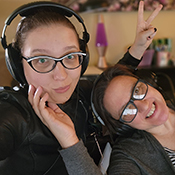Previously:
- Zinnia goes to college, gets more knowledge (June 2019)
- Zinnia’s continued college adventures: summer 2019 (August 2019)
 I’ve been posting occasional updates on my experiences since starting college in January of 2019, and as I’ll have attended for two years this December, another update is in order. After four semesters at the community college, I transferred this year to the nearby state university from which my wife and fellow contributor Heather graduated a few years ago. I’ve made the dean’s list in all previous semesters and expect to do so this semester as well, and I anticipate receiving my bachelor’s in statistics some time in 2022.
I’ve been posting occasional updates on my experiences since starting college in January of 2019, and as I’ll have attended for two years this December, another update is in order. After four semesters at the community college, I transferred this year to the nearby state university from which my wife and fellow contributor Heather graduated a few years ago. I’ve made the dean’s list in all previous semesters and expect to do so this semester as well, and I anticipate receiving my bachelor’s in statistics some time in 2022.
What I’d most like to highlight is that this has been nothing like what I expected, in the best possible way. Before I started, this experience was wholly unfamiliar to me and something I viewed with dread and bitter, deep-seated personal insecurity. No matter how much anyone (Heather) told me that this would be relatively straightforward and not particularly challenging for me, it was emotionally tinged with a sense of utter inadequacy inculcated by my family for years after I dropped out of high school. It was intimidating – trying meant the possibility of even further failure. But after two years at college, I wish I could have convinced myself to get started years earlier.
It turns out I really like going to school, and I’ve found some approaches to streamline the experience and make it as enjoyable as possible. For all semesters except the first, I’ve been taking online courses. Given the requirements that come with being a stay-at-home mom and doing stay-at-home mom things, the flexibility of online courses has been extremely convenient; given a barely-controlled pandemic this year and my multiply-high-risk wife recovering from several strokes over the summer, it’s just plain necessary. But that flexibility also demands a substantial investment in organization and self-motivation. What the classroom environment did offer was a space of singular focus, where for a dedicated block of time there was simply nothing to think about other than devoting all of your energies to paying sharp attention, taking notes, and asking informed followup questions.
Managing online coursework involves study and work in an environment that wasn’t made with this in mind at all. In this setting, it’s been extremely important for me to set aside whatever uninterrupted time I can find, and use it to be very thorough with my work. I strongly recommend studying in detail – as in reading each sentence with intention and not just plowing forward regardless if you haven’t understood some part of the material – and taking extensive notes. Essentially all of my work in online courses has consisted of reading a text on my own and following the directions it contains; I’ve made almost no use of recorded lectures or other media. And no matter my abysmal handwriting, engaging my hands seems to help me retain the material as I review it.
Never bothering to study or take notes now seems like it played a large part in my failure at K-12. It really doesn’t seem to matter what inherent aptitude you might have, however that may be measured; detailed studying and note-taking is beneficial and necessary and I’ve noticed a clear difference when I don’t invest sufficient time in this. Starting earlier in the day when you’re less fatigued is generally a good idea, and if a random burst of motivation happens to strike you at any time, seize it and get ahead on your work. The heavy functional demands of college mean that if you have untreated depression or ADHD (or gender dysphoria, or depersonalization), starting college would be a very good time to make sure this is treated in whatever way is most effective for you.
I’d also like to address certain perceptions specifically about math as a subject. I’ve often seen this treated as something that’s uniquely difficult apart from anything else in school, and I felt that way myself for a while – of all subjects on the ACT, GED, and college placement exam, math was the one in which I scored lowest. I’m still not sure why or how I was in Math Olympiad in elementary and middle school. But while all the things I didn’t know about math were intimidating at first, as I continued to work through the material, I slowly realized it’s really not that imposing. I’ve so far taken intro to statistics, statistical methods I, intermediate algebra (essentially high school-level algebra), college algebra, and college trigonometry, and I just really enjoy math and the process of acquiring skills in this area. I now feel that this level of math may not actually be unusually hard or (for most people, dyscalculia aside) something where some of us are just “bad at math” and others are not. It seems to reward detailed study just as every other subject does, and I’ve so far not reached a point where the content is inherently inaccessible to my capabilities. There’s just math that I happen not to know yet, and there will come a time when I do know it. In fairness, training in statistics doesn’t involve having to ingest a great deal of higher mathematics or make original innovations in the field – I just made the personal judgment that this struck a good balance between what I enjoy doing and what will likely position me well for a career in data science (I’ve seen this described as the “sexiest job of the 21st century”; I would argue that any position becomes the sexiest job once I start working there).
Going to college in my 30s has also been different in some ways from the typical experience of traditional young adult students. There are required core classes and assignments that, in the context of my life experience, are dull, redundant, or just silly. Several courses have had assignments about putting together a resume, applying for jobs, and the aspects of professionalism involved in writing an email (I did learn that most of my younger classmates do not check their email daily, preferring Instagram or… something). One session involved exercises in “making wise choices”, as though I hadn’t already had ample time in my life to reflect on my unwise choices. I automatically failed all three speech assignments in my required public speaking class as I was not able to locate enough “audience members” to attend my video recording, effectively serving as a penalty for my lack of friends; my prior experience actually delivering public speeches in various contexts was not really relevant here. I’m now finishing a course in technical writing after several years of writing reports at a marketing agency.
Regardless – and this is something Heather made clear to me – the best approach to any assignment, no matter how insipid, is to pay attention to the requirements and be sure you meet all of them. This is not the time for individual judgment or executive decisions about what you feel would be the best way to go about doing something, and you are certainly not special to those in charge. At the same time, there have been courses that were unexpectedly rewarding and enjoyable. I got far more out of international politics/international relations than I thought I would, and although French was challenging and foreign languages aren’t an area of great interest for me, I can now go around reading and pronouncing French phrases correctly like a show-off.
There have also been times where I’ve had to make compromises and haven’t been able to get everything I wanted, and the pandemic has forced some adaptations to reduce my family’s exposure. My adviser emphasized it was important to complete precalculus and calculus I promptly, preferably by doubling up on them in the coming semester, as these are prerequisites to many of the courses in my major. However, because these turned out only to be available in-person, my current plan is to study intensively and take the CLEP exams in precalculus and calculus for credit, and hope that the world is less plague-ridden by summer.
In case it isn’t obvious, I’m having to take on this significant long-term commitment within a situation – a pandemic, a wife with serious medical conditions, two children I’m helping with remote learning – that is incredibly fluid. Having any kind of plan at all seems overly optimistic in the world right now, but there’s no alternative: you go through it, and you keep going.
I want to keep going. ■




3 Responses to Notes on my first two years at college as an adult learner